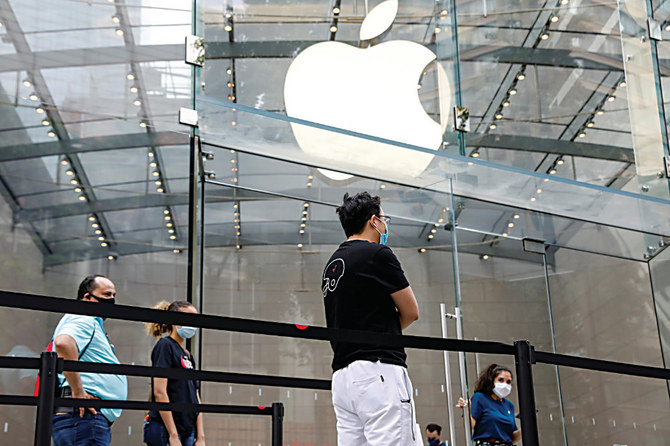NEW YORK: Every day, energy merchants collect and scrutinize whatever information they can find on fuel demand to get a trading edge: From satellite data tracking oil tankers worldwide to thermal images from cameras on pipelines and storage tanks.
Real-time data on fuel demand would be the ultimate prize.
On-the-spot gasoline consumption figures would change the way oil markets trade, because it is “the holy grail of metrics,” said Patrick DeHaan, head of petroleum analysis at GasBuddy.
A few weeks ago, the market thought it had found it. In mid-April, Apple Inc. unveiled new data tracking human mobility trends, capturing user activity in searching for directions on smartphones.
The timing was perfect. Traders were chasing any clue to fathom the speed of recovery from the fastest and deepest collapse in fuel demand in history during coronavirus lockdowns. They relished the chance to incorporate mobility data into trading models.
But US Memorial Day came, and the search data did not translate into activity. The US Energy Information Administration (EIA) proxy for gasoline demand fell nearly 6 percent for the week including the holiday. Gasoline futures, which had rallied into Memorial Day, fell after the holiday that kicks off the summer driving season.
That disappointed traders, given roughly 70 percent of oil consumption worldwide is via vehicles, and as current data for retail demand generally looks either at the previous week or earlier periods. Several traders told Reuters on background that the discrepancy caused them to discount Apple’s index. The sticking point, they said, was that Apple’s mobility data is based on search information rather than miles traveled. Matt Sallee, managing director of investment firm Tortoise Capital Advisers, said that data has not correlated as strongly to demand as other indexes.
Apple declined to comment. Settings for the iPhone include an option to limit notifications when the device perceives someone is driving, but it is unclear if Apple intends to use that data to enhance its mobility index.
Sallee said that he was still using Apple’s figures, but combining them with other datapoints to make decisions as an energy-focused stock fund manager.
“The pandemic made everyone a lot smarter about sourcing and using real-time demand data, a trend I think is here to stay even after it subsides,” Sallee said.
He also uses data from TomTom, the global location technology company, which monitors real-time traffic congestion in major world cities, along with the Dallas Federal Reserve Bank’s mobility and engagement index. That index tracks various mobility metrics, including how far user devices travel in a day and how long they stay away from home. The figures are reported on a lagging basis.
On the retail side, the mainstays have long been GasBuddy, which monitors fuel prices and transaction volume at gas stations across the United States and Canada, and Oil Price Information Service (OPIS), which provides pricing and news information for a variety of refined products.
Apple’s data purports to capture everyone that owns an iPhone, about 100 million people in the US alone.
RBC analyst Michael Tran said that currently he finds TomTom more reliable than Apple searches, in part because most people do not use apps to map out their commute. RBC combines TomTom data with other geolocation data compiled in-house for research purposes.
John Kilduff, partner at hedge fund Again Capital in New York, said he can foresee a time when retail gasoline trackers are as abundant as companies tracking pipeline flows. Still, those reports can send contradictory signals or end up at odds with official EIA figures.
“For now, I will stick to the EIA report,” Kilduff said.
























